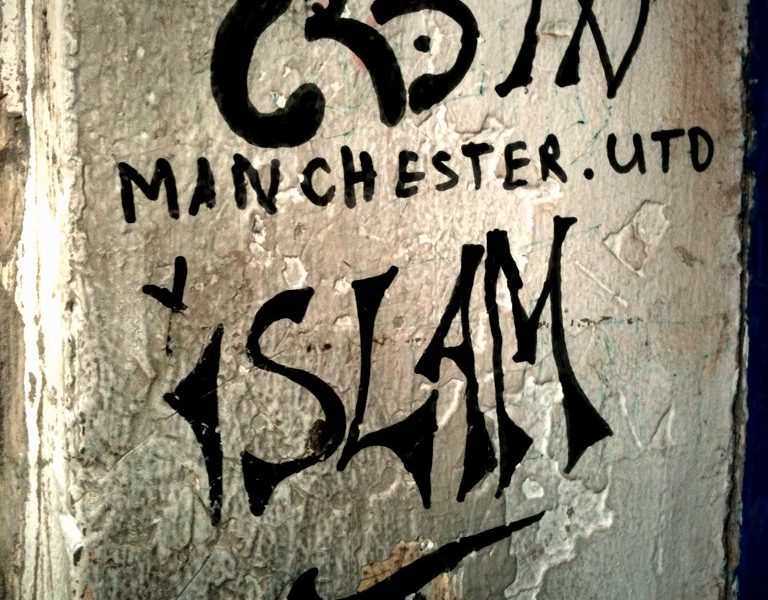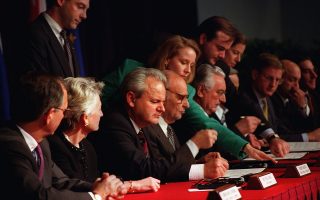The end of the Cold War did not spark the ‘end of history’ as American historian Francis Fukuyama famously stated, but according to Samuel Huntington it triggered a so-called ‘clash of civilizations’ between the Western and Islamic worlds. It is this international cultural rift which is disputably the root to understanding the tensions faced by twenty-first century Muslims inhabiting the West.
Fukuyama argued that the collapse of communism in 1991 had secured the triumph and “universalisation of Western liberal democracy.” Nonetheless, although communism was no longer viewed as a threat to the West’s desired world hegemony, Islam — as the largest growing religion — was soon regarded as the new antithesis of liberal democracy. Where democracy has been celebrated as the epitome of freedom, Shari’a law has been increasingly denounced as ‘that symbol of despotism.’ It can be no coincidence that Muslims are demonized by Western propaganda as ‘the commies’ of the twentieth century once were. Evidently, the supposed ‘War on Terror’ has displaced the ‘War on Communism.’ Tragically, the common view has become that it is human to discriminate. It seems that we can only love and understand ourselves when we learn to hate what we are not. And it is in fact, the Western media and government that propagate this hateful opinion in an attempt to divide us by convincing us that there is an ‘us’ and ‘them’, an ‘ours’ and ‘theirs’ — and unsurprisingly, only serve to breed profound hostility and stigma towards ‘the other.’
In 1770, the French liberal thinker Voltaire famously quoted: “I detest what you say, but will defend to the death your right to say it.” Ironically, it is the same nation in which Voltaire had written of mutual tolerance over 240 years ago, that today alienates the Muslim community through the criminalization of the burqa. In 2009, it was the former right-wing President of France, Nicolas Sarkozy who branded the burqa as “a sign of the subjugation, of the submission of women,” which came to portray Islam as backward and oppressive – the opposite of the West. In the process of doing so however, Sarkozy failed to recognise that many Muslim women living in Europe find liberation and empowerment beneath their niqab (face-veils). It is somewhat hypocritical of Western politicians to associate Islam with ‘female enslavement,’ when the sexual objectification of women in the West is more convincingly, a deeper form of “subjugation” and “submission.” Thus, in a manner no less than contradictory, it is clear that the West feels it can define freedom on its own terms, even if that must mean shunning the Muslim conception of freedom. Scapegoating and vilification of a minority is not a new occurrence. In the 1930s, Hitler and the Nazis blamed the Jews unjustly for Germany’s position as a broken country, and were therefore able to strengthen their own resolve. Certainly, targeting enmity towards a small and vulnerable group within society can help to avert disillusionment towards the state government internally.
I believe the ‘clash of civilizations’ is no doubt a Western myth. For neoconservatives in particular, it stands as the ideal justification for international action or what others have viewed as contemporary ‘Western imperialism’ — after all, we only have to turn our attention to British and American anti-terror laws and military action in the Middle East. The West requires an enemy that it can portray and smear as ‘barbaric’ and ‘not like us’ in the purpose of thriving, prospering and boasting its own ‘civilised’ make-up — as Randolph Bourne remarked in 1918, “war is the health of the state”. Following the 9/11 terrorist attacks, anti-Muslim rhetoric was inflamed and that new ‘enemy’ was characterised by the Muslims, Islamists, extremists or whatever the label may be. Ever since, what many non-Muslims have forgotten, is that Islam was not born out of 9/11 but rather emerged fourteen hundred years ago during the Prophethood of Muhammad (pbuh). Al-Qaeda, and for that matter all Islamist terrorist groups and tyrannical Islamist states cannot and do not represent the 1.6 billion Muslims across the world (almost a ¼ of humanity) many of whom prize Islam as ‘that religion of peace.’
Misrepresentations, misinterpretations and sweeping generalisations can only be resolved through education. It is this notion of enlightenment and gaining knowledge that is best embodied in Allah’s (SWT) first command to the believers in the Qur’an, “Iqra” translated as “Read” (96:1). In fact, in a fascinating yet paradoxical report, it was discovered that many Americans and Britons turned to Islam post-9/11. English translations of the Qur’an headed the American best-seller list and in 2010, the American Religion Census demonstrated that Islam was the fastest growing religion in the country in the last 10 years, with over 2.6 million living in the US today, which is up from 1 million in 2000. How was it that a religion that is supposedly so closely connected with terrorism and violence increasingly able to attract followers and believers? Arguably, the prominence of Islam in the news, particularly through anti-Muslim sentiment raised awareness of the faith and thus prompted people to figure out what was ‘wrong’ with the religion, as the papers were saying. Driven by curiosity, many became converts.
It is not mainstream Islam that intends to push ‘the clash of civilizations’ as underpinned by Surah Al-Kafirun: “for you is your religion, and for me is mine” (109:6), but rather Western institutions that have provoked religious intolerance and polarisation.
Photo by Dr John2005 



